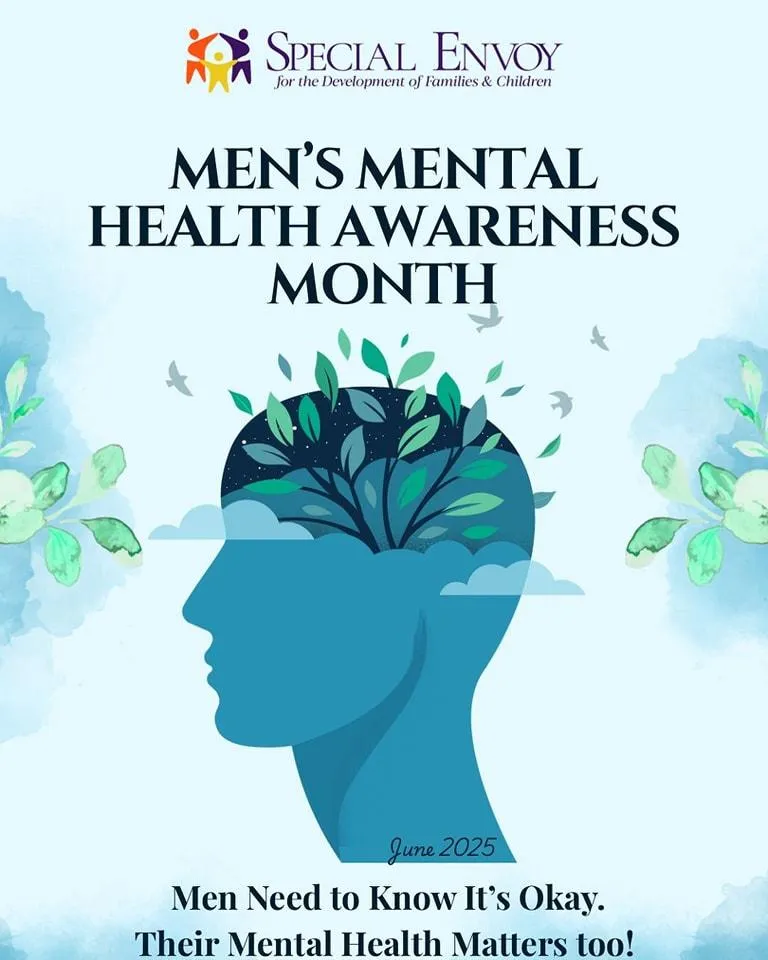Welcome to Our Blogs
INCREASE YOUR AWARENESS
Follow along as we share valuable knowledge and content to enrich and empower your everyday life.

Men's Mental Health Awareness Month
Men’s Mental Health Awareness month is observed in June. It is a time to raise awareness about the mental health challenges men face and to break the stigma that prevents many men from seeking the help they need.
According to Mental Health America, over 6 million men suffer from depression per year. However, it often is not diagnosed.
There are several reasons why men with depression often aren’t diagnosed (Mayo Clinic, 2025) :
- Not recognizing depression : Men often think that physical symptoms such as headaches, digestive problems, or irritability are unrelated issues rather than recognizing them as potential signs of depression.
- Downplaying Symptoms: Many men ignore how much their symptoms affect them, so they turn to unhealthy behaviors to hide their depression.
- Not wanting to talk about symptoms: Because of societal expectations, men shy away from talking about their symptoms to close friends, family, or professionals.
- Refuse treatment: Men refuse treatment because they are hesitant to get diagnosed or treated, believing that the stigma or depression could negatively affect their careers, relationships, or reputation.
Symptoms can differ in both men and women. Men may experience:
- Anger, irritability, or aggression.
- Physical symptoms (headaches, digestive issues, chronic pain)
- Misuse of alcohol and/or drugs.
- Risk taking behaviors (eg. Reckless driving)
- Escapist behavior- spending too much time at work or on sports
- Violent, controlling, abusive behavior
- Changes in mood, appetite, or energy level
- Suicidal thoughts
- Difficulty concentrating
Asking for help can be difficult for men. There are treatment options available such as:
- Therapy - Which includes Cognitive Behavioral Therapy (CBT), Psychotherapy etc.
- Medication - Antidepressants, Anxiety medications. Along with therapy is effective.
- Regular exercise, a healthy diet, and enough sleep.
- Support groups: speaking with others who have gone through a similar path can help normalize the experience as well as reduce shame.
Men need to know that it is okay to ask for help. It is not a weakness. It is a sign of strength.
Together, let’s normalize asking for help, reaching out, and supporting men. Let’s break the stigma around Men’s Mental Health.
The Importance of Fatherhood: Love, Protection, Emotional Support

A father is not only a provider, he embodies love, he is a protector, and a emotional support system.
Love: The love of a father forms a child’s sense of worth and connection. It instills empathy, patience, and resilience that fosters a future in confidence and kindness.
Protection: Fathers offer security and safety. Not just physical protection, but emotional and mental as well. Fathers constant presence assures children that they are not alone facing the world.
Emotional Support: In a society that frequently urges men to remain quiet, great fathers demonstrate strength through vulnerability. They listen, they affirm, and they foster create a space for honest conversation.
Not just today, but every day, let’s celebrate fathers, father figures, and mentors who show up with courage and love each day. The presence of a father matters more than you know!
The Importance and Impact of Positive Male Role Models

Whether a father, stepfather, uncle, teacher, or trusted mentor is involved in a child’s life, it can have a lasting and transformative impact. This involvement serves as a powerful example of responsibility, security, emotional strength, and love.
The involvement of active, present, and emotionally available fathers or positive male role models is important for both boys and girls (Osita Ibekwe, 2023):
For boys, it helps them to develop and learn emotional intelligence, responsibility, and healthy masculinity.
For girls, it helps them to develop stronger self-worth, resilience, and build healthier relationships based on respect.
According to the U.S. Department of Health and Human Services, children with involved fathers and male role models are more likely to thrive emotionally, academically, and socially and less likely to engage in rebellious behaviors.
While the involvement of positive male role models makes a difference, let’s not overlook the strength of single mothers who show up every day with love, protection, and consistent presence.
To all male role models, your presence and consistency matter. Let’s recognize the men who consistently show up and give their unwavering love and support.
Sources:
Mayo Clinic. Male Depression: Understanding the Issues. Mayo Clinic, 2024, https://www.mayoclinic.org/diseases-conditions/depression/in-depth/male-depression/art-20046216
The Fatherhood Project. The Impact of Fatherhood on Men’s Health and Development. The Fatherhood Project, 2024, https://thefatherhoodproject.org/the-impact-of-fatherhood-on-mens-health-and-development/
National Institute of Mental Health. Men and Mental Health. National Institute of Mental Health, 2024, https://www.nimh.nih.gov/health/topics/men-and-mental-health
American Psychological Association. Men: A Different Depression. American Psychological Association, 2005, https://www.apa.org/topics/men-boys/depression
@ Copyright 2026 - Special Envoy for the Development of Families & Children| All rights reserved

